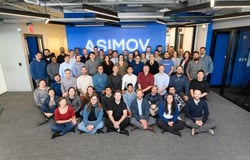Company Overview:
Strand Therapeutics is a clinical stage biotechnology company utilizing synthetic biology to genetically program mRNA to deliver truly revolutionary immunotherapies to patients.
Building on the idea of creating smart therapies based on Boolean logic circuits, Strand was started by biological engineers working together at MIT who were seeking to apply the concept of the emerging field of mRNA therapeutics. Strand's technology is therapeutic-area and mRNA modality agnostic where therapeutic proteins are encoded onto modified, self-replicating, or circular mRNA backbones which in turn are programmed with cell-specific sensors and circuits.
Today, Strand has established three platforms with one clinical stage asset and several programs in preclinical development as well as early discovery. Our lead program, STX-001, is currently being evaluated in a phase 1 clinical trial for solid tumors. Our corporate headquarters is located in the Fenway district of Boston, Massachusetts with an additional site based in Watertown, Massachusetts.
Become the next standout single strand!
Job Summary:
Strand is looking for people who have the enthusiasm and motivation to be a highly contributing member of a small but extremely productive team. This opportunity will offer the employee the ability to work in a matrix-based environment and be a part of the future strategy of the company.
We are looking for a highly motivated and innovative candidate for the role of Associate Scientist of Nanoparticle Process Development. This individual will support in production and scale up of LNPs with nucleic acid payload. Reporting to the Senior Scientist of Nanoparticle Process Development, the right candidate will be a strategic thinker that brings a leadership presence and enthusiasm for Strand along with a deep scientific knowledge.
Primary Responsibilities:
- Execute experiments related to LNP mixing and downstream purification/filtration to improve the process.
- Contribute to development of a robust formulation process with emphasis on scale-up, tech-transfer and stability.
- Contribute to thorough characterization of LNPs by existing methods and collaborating with internal stakeholders on developing new methods.
- Coordination with other team members to support the group's research activities in a fast-paced and collaborative environment.
Qualifications:
- B.S. with at least 1-3 years of relevant experience or M.S. with at least 1 year of relevant experience with an educational focus in Chemical Engineering, Bioengineering or similar preferred.
- Experience with LNPs required and nucleic acid payloads highly preferred.
- Experience with TFF required with emphasis on LNPs preferred.
- Experience with QbD principles, scale up efforts and JMP DOE preferred.
- Experience with various mixing geometries as well large scale LNP production preferred.
- Strong collaboration and inter-personal skills.
- Ability to multi-task and prioritize to meet important deadlines.
Strand offers a fast-paced, entrepreneurial, team-focused small company environment. We also offer a top-notch benefits package (health, dental, life, open PTO, onsite lunch catering, commuter support and more) and work/life flexibility and integration. Being part of the Strand team allows you to become part of a small team that supports professional development while working together to meet Strand’s goals.
Strand Therapeutics is an equal opportunity employer. We do not discriminate on the basis of race, color, gender, gender identity, sexual orientation, age, religion, national or ethnic origin, disability, protected veteran status or any other basis protected by applicable law. Strand does not accept unsolicited resumes from any source other than directly from candidates.
Job Type: Full-time
Salary: commensurate with role and experience
Top Skills
What We Do
Strand was started by biological engineers working together at MIT. Building on the idea of creating smart therapies that are capable of making sophisticated decisions, they sought to apply the concept of the emerging field of mRNA therapeutics. This area was untapped by traditional synthetic biology, which led them to build their own mRNA “programming language,” creating the world’s first platform for mRNA smart therapies.
Strand’s mRNA programming technology promises to make mRNA therapies safer and more effective by programming the location, timing, and intensity of therapeutic protein expression inside a patient’s body using mRNA-encoded logic circuits. These circuits can implement cell-type specific expression by sensing and classifying the unique miRNA expression signatures of cells, as well as controlling the dosage of protein expression by responding to exogenously administered small molecules.









